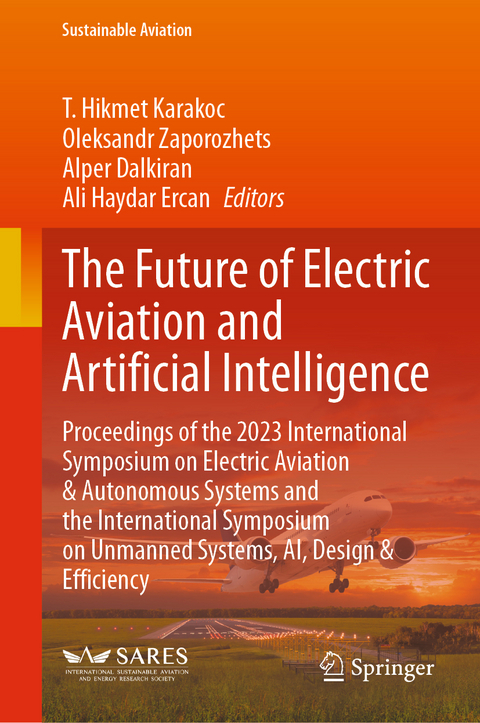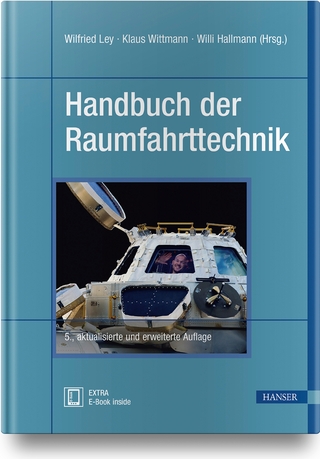
The Future of Electric Aviation and Artificial Intelligence
Springer International Publishing (Verlag)
978-3-031-62093-5 (ISBN)
- Noch nicht erschienen - erscheint am 14.12.2024
- Versandkostenfrei innerhalb Deutschlands
- Auch auf Rechnung
- Verfügbarkeit in der Filiale vor Ort prüfen
- Artikel merken
The Future of Electric Aviation and Artificial Intelligence presents a unique collection of proceedings papers from two multi-disciplinary symposiums on sustainable aviation and unmanned systems, offering a comprehensive view of the latest research and insights. The International Symposium on Electric Aviation and Autonomous Systems (ISEAS 2023) presents aerospace, autonomous, and piloted unmanned systems research. The International Symposium on Unmanned Systems, AI, Design & Efficiency (ISUDEF 2023) gathers researchers, scientists, engineers, practitioners, policymakers, and students working on topics in the unmanned systems industry and artificial intelligence (AI). The collected papers provide insights on a broad range of current issues in aviation, including hybrid, electric, all-electric, and fuel cell aerial vehicles, electric generation, energy storage, propulsion technology, design issues, AI applications, efficient operations, and new identification and detection systems that adapt to the latest technology standards. ISEAS 2023 and ISUDEF 2023 allow researchers, scientists, engineers, practitioners, policymakers, and students to exchange information and professionals to present new technologies and developments and discuss future direction, strategies, and priorities in aviation and sustainability.
T. Hikmet Karakoc, Ph.D., graduated from Anadolu University, the Department of Mechanical Engineering. He received his M.Sc. degree in Mechanical Engineering from the Yildiz Technical University. He received his Ph.D. from Anadolu University, where he started his full-time teaching and received his Full Professorship. He is currently researching at the Eskisehir Technical University. He has a wide range of research interests, including sustainable aviation, aircraft propulsion systems, insulation, heating, ventilating, and air conditioning (HVAC), indoor air quality, gas turbines, cogeneration systems, renewable energy, energy economics, fuels, and combustion. He has participated in numerous industrial projects on these topics as a researcher, consultant, and project manager for over 30 projects and corporations. He also started a contest on special insulation applications among university students. He served as an Editor-in-Chief, guest editor, and editorial board member for international scientific journals. He published national and international papers in over 300 journals and 40 books. Professor Karakoc actively follows membership positions for the Chamber of Mechanical Engineers and many sectorial associations, international scientific organizations, and societies. He is an active Board of Directors member of the International Association for Green Energy. He is currently holding the presidency of the SARES organization, which is actively supporting scientists and students in the area of sustainable aviation. He also organizes four symposiums on aviation subject areas as a Founding Chair.
Pawel Stezycki, Ph.D., is Director of the Lukasiewicz Research Network - Institute of Aviation, Poland.
Krzysztof Zaremba, Ph.D., is Rector of the Warsaw University of Technology. Professor Zaremba has been the Dean of the Faculty of Electronics and Information Technology of the Warsaw University of Technology since 2012. His research interests relate to nuclear electronics, mainly the construction of radiation detectors and measurement systems used in radiation research. He also conducts research in the field of biomedical engineering. He is the author or co-author of over 170 scientific publications in journals indexed in the Journal Citation Reports (JCR) Science Edition database and several technical reports published in foreign centers.
Miroslaw Kowalski, Ph.D., is Director General of the Air Force Institute of Technology, Poland. He graduated from the Military University of Technology (WAT), Faculty of Mechanical Engineering, and received a doctorate in technical sciences in 1996 from the Faculty of Armament and Aviation of the Military University of Technology, and in 2013, a habilitated doctorate in technical sciences in the field of machine construction and operation at the Faculty of Working Machines and Transport of the Poznan University of Technology. From 1987 to 1995,Dr. Kowalski advanced through the 58th Aviation Training Regiment ranks from aircraft operations commander to technical squadron engineer. After transferring to the Air Force Academy (currently the Military Aviation Academy), he served as a senior department engineer until 1998, simultaneously supervising the work of the Engineering and Aviation Service staff of six school regiments. In January 1998, he transferred to the Air Force Institute of Technology (ITWL), where he held the following positions: Director of the ITWL, Assistant Professor, Head of the Laboratory, Deputy Head of the Department, Deputy Director, and Associate Professor. In September 2018, the Minister of National Defense appointed Dr. Kowalski as Director of the Air Force Institute of Technology. His achievements include over 140 scientific publications and papers and over 100 research studies. He is the author of numerous patents, expert opinions, and reports. He is a member of domestic and foreign scientific counci
Chapter 1. Parametric Approach to Initial Weight Determination at Preliminary Design of a Quadrotor Cargo UAV.- Chapter 2. Comparative Analysis of AI-Supported Drone Operations: Evaluating Critical Aspects Among Pilot Groups.- Chapter 3. Nontraditional Attitude Filtering with Uncertain Process Noise.- Chapter 4. Exergetic Attribute of Fuel Cells In Hydrogen Aviation Including UAVs.- Chapter 5. Direct Numerical Simulation of a Thermal Turbulent Boundary Layer: An Analogy to Simulate Bushfires and a Testbed for Artificial Intelligence Remote Sensing of Bushfire Propagation.- Chapter 6. Unmanned Aerial Vehicles Cooperation for The Monitoring of Greenhouse Gases.- Chapter 7. Fast-Time Large-Scale Simulations for Unmanned Air Traffic Airspace Capacity Assessment.- Chapter 8. On The Technological and Operational Aspects of the Greening of Aviation.- Chapter 9. Review and Analysis of the Integration Properties of an Aircraft with a Hybrid Power Plant.- Chapter 10. Optimization of Quadcopter Energy Consumption: Insights from Wind Condition Analysis and Trajectory Planning.- Chapter 11. Sustainable Aviation Fuels and Their Use for Large Long-Range Aircraft.- Chapter 12. An Overview of The Possibilities, Current Status, and Limitations of Battery Technologies to Electrify Aviation.- Chapter 13. The Potential of a Proton Exchange Membrane Fuel Cell Powered Light Aircraft Employing Cryogenic Hydrogen.- Chapter 14. Fault Tolerant Estimation of UAV Dynamics in the Presence of Sensor/Actuator Faults
.- Chapter 15. Hydrogen Storage in a Commuter Aircraft: Combining Classical Engineering Design Process With Model Based System Engineering for CFRP Pressure Vessel Integration.- Chapter 16. Review of Liquid Hydrogen Tanks Design Principles for Short and Medium-Range Civil Flights.- Chapter 17. New Supersonic Aircraft Emission and Air Pollution Assessment At Airport Operational Scenario.- Chapter 18. Aircraft Emission and Fuel Burn Assessment Scenarios at Local and Global Levels.- Chapter 19. Noise Assessment Scenarios for New Airplane Climate Efficient Designs
.- Chapter 20. Composite Gradient Coatings Design for Ensuring Electromagnetic Compatibility of On-Board and Ground Electronic Equipment.- Chapter 21. Renewable Energy Systems for Airports And Aerodromes: a Comprehensive Patent Review and Technological Analysis.- Chapter 22. Adaptation of Smart Energy Map to Transportation Domain a Case Study to Small Airfield Buildings and Other Infrastructures.- Chapter 23. Modeling the Noise Characteristics of a Regional Turboprop Hybrid-Electric Aircraft .- Chapter 24. Concepts of Commercial Aircraft with Hybrid Propulsion.- Chapter 25. Highly Accurate and Confident Basic Aircraft Noise Assessment Scenario.
| Erscheinungsdatum | 24.11.2024 |
|---|---|
| Reihe/Serie | Sustainable Aviation |
| Zusatzinfo | XI, 172 p. 73 illus., 60 illus. in color. |
| Verlagsort | Cham |
| Sprache | englisch |
| Maße | 155 x 235 mm |
| Themenwelt | Technik ► Luft- / Raumfahrttechnik |
| Schlagworte | aircraft design • Aircraft HVAC • Autonomous Systems • conference proceedings • Electric Aviation • Energy Storage • Fuel Cells in Aircraft • Hybrid-Electric Propulsion Systems • Sustainable aviation • unmanned aerial vehicle (UAV) |
| ISBN-10 | 3-031-62093-3 / 3031620933 |
| ISBN-13 | 978-3-031-62093-5 / 9783031620935 |
| Zustand | Neuware |
| Haben Sie eine Frage zum Produkt? |
aus dem Bereich


